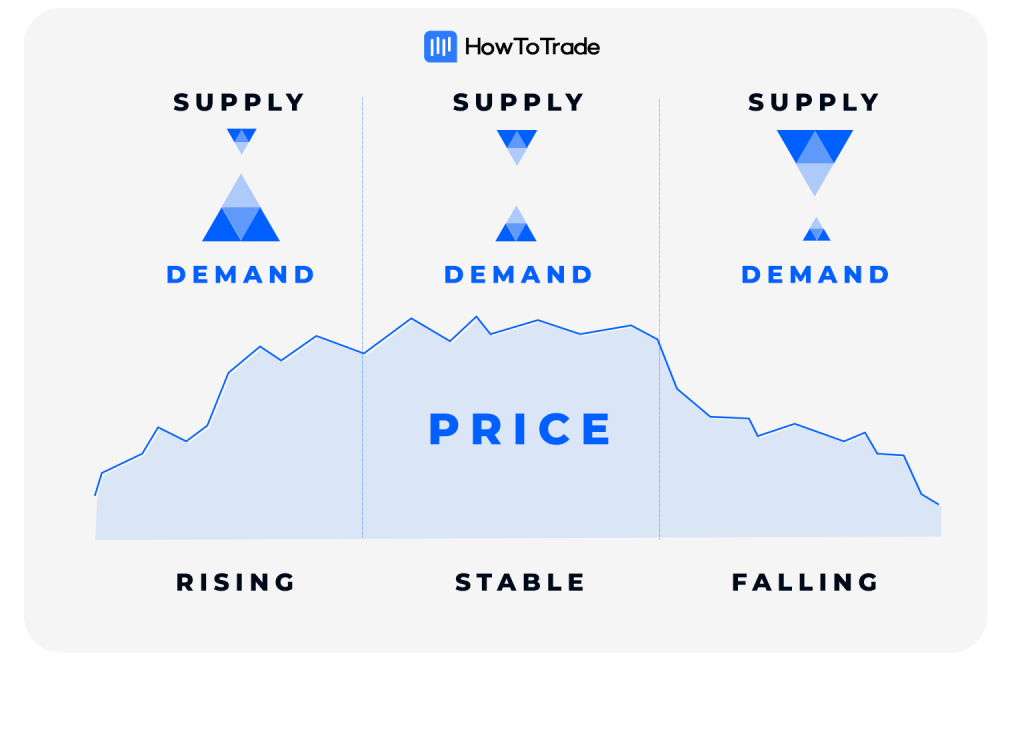Why Do Stock Prices Fluctuate?
When you own a stock (or ten), you want its prices to increase. This is simply because when the stock price goes up, the shares automatically become worth more. But if you’ve ever seen a stock chart or watched stock prices at all, you’ll know that the stock prices don’t only increase.
They go up and down, then they range, and we could go on and on. The point is that stock prices change every day. Hell, they change every minute of every day. And all these movements are caused by different market forces that explain how the stock market works.
These could be supply and demand, economic crises, company scandals, earnings reports, analyst predictions, etc. Now, to help you understand all these different market forces that cause volatility, we’ll look at the most important ones in more detail below.
Understanding Supply And Demand
Before we get started, let’s take a second to remember how stocks are exchanged. Let’s say an investor is looking to buy shares in a certain organization. They are matched with somebody who is trying to sell their shares in that same organization.
But what happens if more people are looking to buy the particular company shares than people looking to sell? In such cases of high demand, the prices of stocks often increase, which convinces the owners to sell.
And it works the other way too! If more people are looking to sell than investors are looking to buy, prices will decrease, which subsequently attracts more buyers. It looks something like this.

As you can see in the image, this is how supply and demand work. Stock prices change based on the number of buyers and sellers and the current stock price can rise or fall accordingly. Simply put, when there are more buyers than sellers, the stock price will rise and vice versa.
What Drives The Stock Demand?
While the supply side hugely impacts stock prices, investors usually try to analyze the demand side as it is usually the main driver of the stock’s price. There are many, many factors that have an influence on the overall demand for a stock and, ultimately, its price.
Let’s take a look at some of the factors that push stock prices up in more detail below.
Company Profits
An organization’s profits are amongst the most essential factors for stock prices. At the end of the day, we are all in it to make money, and nobody wants to invest in a company that is not bringing in the dollars. Am I right? So, you always want to invest in a profitable company, or one that is expected to be profitable at some point in the future (growth stock, penny stocks, etc). Further, you must be alert to the company’s quarterly earnings reports to get an idea if the company is profitable and is moving in the right direction.
Publicity
Even though they say there is no such thing as bad press, this does not apply to the stock market. One bad public announcement or a news piece and watch the company’s stock prices sink faster than Titanic. On the other hand, good news will help the stock price move up and improve market sentiment.
Growth Potential
An organization’s growth potential that is based upon forecasts and analyst reports also affects the prices of a stock and the perceptions of investors big time. For example, suppose the company is expected to be profitable in the future or has a revolutionary product. In that case, it has a significant effect on the company’s future cash flows; the share price can rise even though the company is not yet profitable.
Central Banks and Governments Policies
When central banks or governments make big decisions that impact people or change important policies, the stock market and financial markets react to these with market volatility and adapt prices. After all, as we have seen since the 2008 crisis, interest rates are at low levels, which means that money flows into the stock market, and therefore, stock prices will rise. Conversely, when central banks announce rate hikes, stock prices are expected to fall.
Economic Data
When vital economic data is released, the impact on the stock market is significant. This data could be anything from labor rates, financial news, GDP, non-farm payrolls, interest rate, or consumer spending. If the data report is better than predicted, the stock market’s value increases. But, on the other hand, if these economic indicators are worse than expected, folks will want to get rid of their stocks, and the stock market’s value will decrease.
Conflicts
If terrorists blow up an oil field, activists start protesting against child labor practices, or if a global crisis occurs, all these events would significantly affect stock prices. So, in a word, political conflicts have an impact on the economy and the stock market.
Rumors
Rumor has it the stock market is as bad as a Tennessee High School, rumor-wise!
‘The CEO is about to step down!’ ‘The CFO is accused of fraud!’ ‘The Head of Board is about to be investigated!’ ’The management is talking about selling the company!’
Credible or not, all these rumors have a HUGE impact on investors’ decision-making processes and, therefore, the stock prices. If you don’t believe us, then see what happens to Bitcoin, Dogecoin, or Tesla stock when Elon Musk says something.
Final Thoughts – Is It Possible To Predict Stock Price Changes?
Yes, it is possible to predict stock price changes. To a certain degree. And without a guarantee, these predictions might be accurate. Remember that your goal is to have more winning trades than losing. You cannot win all trades, the same as an athlete cannot win all matches. Trading is a marathon, not a sprint!
While you can make educated guesses, it is impossible to know EXACTLY how prices will fluctuate. However, there are ways you can tilt the odds in your favor. Using technical analysis, fundamental analysis, chart patterns, and other trading tools – all of these can help traders predict future price movements of a particular stock. We’ll look at all these in the following lessons to give you the best possible tools to make you succeed in the stock market.
In partnership with our recommended partner
Wait!
"Join our Trade Together program and interact with us in real-time as we trade the markets together."
